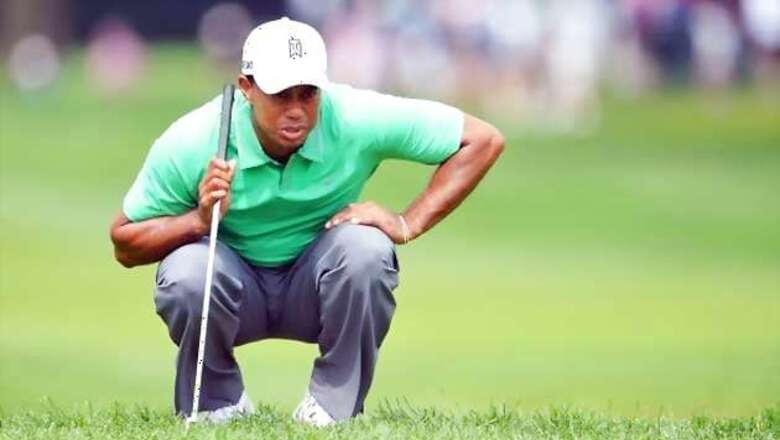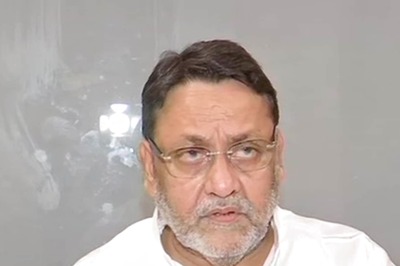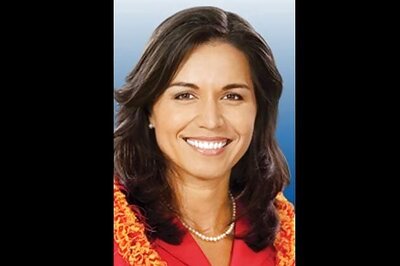
views
Pittsford, New York: Tiger Woods' quest for a major title this year could well have been very different if not for one perfect shot.
Major championships always have a signature moment. The 20-foot birdie putt by Adam Scott on the 18th hole at Augusta National that led to a green jacket. The pure 4-iron that Justin Rose hit into the 18th at Merion. Phil Mickelson's 3-wood onto the 17th green at Muirfield. Jason Dufner's wedge to a dangerous pin on the fifth hole at Oak Hill that stopped a foot from the cup.
The defining moment in another major-less season for Woods was his wedge on the 15th hole in the second round of the Masters.
It hit the pin and shattered his calm.
One inch to the right or to the left and he most likely would have had an easy birdie and the outright lead. Instead, the ball caromed off the green and into the water, setting off a wild chain of events that put Woods into the middle of a controversy that wasn't his doing except for inadvertently taking the wrong drop.
Information leaked to broadcaster ESPN and Golf Channel didn't help. For two hours, all anyone knew was that Woods was being penalized two shots for the incorrect drop, and thus signed an incorrect scorecard, but he would not be disqualified.
There was outrage, and rightly so. Some of that lingered even after Augusta National offered a reasonable explanation that its decision was based on Rule 33-7, which gives a committee discretion to waive disqualification. In this case, the club said it could have - and should have - talked to Woods before he signed his card. Whether the club let him off the hook is a separate debate. Either way, Woods was seen as the central character in a conspiracy.
Can one shot really make that much of a difference?
There's no way to know how the Masters or the rest of his season would have unfolded. But this much was clear. Those who have spent years around Woods at golf tournaments noticed a sharp change in his outlook in the month leading to the first major of the year.
When he won at Doral, there was an undeniable sense of peace about Woods that had been missing since the scandal in his personal life at the end of 2009. That serenity was evident again at Bay Hill, even as he revealed a relationship with Olympic skier Lindsey Vonn, and he went on to win the Arnold Palmer Invitational with ease.
Woods never looked the same after the Masters, despite winning his next start at The Players Championship.
None of this can be proved, of course. He did have an elbow injury that kept him out for two tournaments this summer. And it's impossible to say what's going on inside someone's head, especially a golfer, and especially someone like Woods.
Even so, few other sports rely so heavily on inner calm. Woods talked about that after his two biggest blowouts in majors - his 12-shot win at the Masters and 15-shot win at the US Open.
"There comes a point in time when you feel tranquil, when you feel calm. You feel at ease with yourself. And those weeks, I felt that way," he said after the 2000 US Open win at Pebble Beach. "I felt very at ease with myself. And for some reason, things just flowed. And no matter what you do, good or bad, it really doesn't get to you."
There is nothing wrong with his game, even as it remains subject to intense scrutiny.
Woods has five wins this year, which includes two World Golf Championships and The Players Championships. That's a career for some players. Yes, he tends to win on the same courses, but maybe that's because he plays the same courses on his limited schedule.
But there was something about the majors this year that brought out a different player.
Nick Faldo said before the British Open that Woods was "not in a good mental place". For some reason, this became news. Jack Nicklaus effectively suggested the same thing in a Golf Channel interview during the final round of the PGA Championship. Nicklaus said Woods was swinging the club a week earlier at Firestone "as well as I've ever seen him swing it", and that his swing wasn't quite the same as he got deeper into the PGA Championship, and further behind on the leaderboard.
Nicklaus said it was "between his ears".
"You start losing confidence," he said. "You try to do something you can't do and then it frustrates you. We all go through those things."
More telling was a prediction from Geoff Ogilvy, who finished the British Open around lunchtime on Sunday and was asked to handicap the final round. Ogilvy thought Muirfield was set up perfectly for Woods, who was two shots behind. The course was yellow and fast, the kind of conditions on which Woods thrives in links golf. His only caveat was that Woods could not afford to lose ground early because it would put too much stress on him. That's about how it unfolded. Woods had a couple of three-putt bogeys early and it was a fight the rest of the way.
Woods hasn't had a mental coach since he was an amateur, and he doesn't need one now. He doesn't need someone to show him clips of Yoda before a major for inspiration. He doesn't need to hear a tired message to, "Trust your swing".
He needs the peace he had in March. And he has to find that himself.
















Comments
0 comment